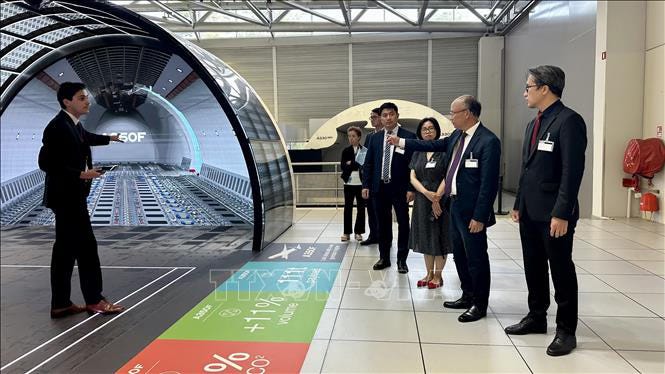Southeast Asia Space Roundup: 26 June to 2 July 2025
A summary of all the space news in Southeast Asia over the past week, brought to you by AzurX
The following are the major space developments in the Southeast Asian region tracked by Southeast Asia Space Monitor over the past week:
Philippines Space Developments
Philippine Air Force to Develop National Security Space Capabilities
Marking its 78th anniversary, the Philippine Air Force (PAF) has announced plans to develop space capabilities as part of its modernization strategy to ensure operational readiness across all domains. PAF chief Lt. Gen. Arthur Cordura highlighted upcoming investments in surveillance, precision strike, integrated air defense, and space systems, building on the 2022 Department of National Defense–Philippine Space Agency agreement focused on satellite-based technologies like remote sensing, GIS, AI, and satellite communications to strengthen national security and resilience.
Elon Musk Endorses Philippines’ Use of Starlink to Bridge Digital Divide
Elon Musk has publicly endorsed the Philippines’ digital inclusion drive following President Ferdinand Marcos Jr.’s June 2025 visit to Marawi City, where Starlink internet kits were deployed to conflict-affected schools. The initiative, part of a broader effort to bridge the education gap in remote and underserved Mindanao communities, leverages SpaceX’s satellite network to deliver high-speed, low-latency internet to displaced students. Musk’s recognition underscores growing international attention to the Philippines’ space-enabled connectivity efforts, following high-level engagements between Philippine leaders and SpaceX earlier this year.
Philippine Telecoms Legislation Exposes Chasm Between Monopolies & Liberalization
The Konektadong Pinoy Act, a landmark Philippine bill aimed at liberalizing the country’s data transmission sector, has sparked a national debate between major telcos and a broad coalition of government, business, and civic groups. Certified as urgent by President Marcos, the bill seeks to dismantle monopolistic barriers by removing the congressional franchise requirement and opening the market to new players, including foreign satellite providers. Supporters argue it will lower internet costs and bridge the digital divide, while the Philippine Communications and Telecommunications Operators (PCTO) warn it risks undermining infrastructure investment and creating an uneven regulatory playing field. The bill’s final approval now hinges on reconciling calls for urgent connectivity expansion with concerns over fair competition and national security.
Vietnam Space News

Vietnam & France Continue to Advance Talks on Space and Satellite Cooperation
During a working visit to Toulouse, France, Vietnamese Ambassador Dinh Toan Thang advanced discussions on satellite and space cooperation, meeting with Airbus and space startup Loft Orbital. Airbus presented Vietnam with potential collaborations in satellite and space technologies, aligning with Vietnam’s digital transformation and Industry 4.0 goals. Loft Orbital offered Vietnam access to low-cost, flexible satellite services for climate monitoring, ocean resource management, and Earth observation. The visit, following President Macron’s recent trip to Vietnam, highlights growing Franco-Vietnamese cooperation in aerospace, technology, and sustainable development.
Vietnam’s Deepening Relationship With Airbus on Earth Observation Satellites
Airbus and Vietnam’s partnership has expanded beyond commercial aviation into a strategic, multi-sector relationship with a strong space technology dimension. Since jointly launching the VNREDSat-1 Earth observation satellite in 2013, Airbus has deepened its space cooperation with Vietnam, working with the Vietnam Academy of Science and Technology (VAST) on future projects like VNREDSat-2 and broader technology transfer and engineering training initiatives. Airbus’s Toulouse-based space division is also collaborating with Vietnamese institutions to enhance Earth observation capabilities and optimize satellite data usage. This space engagement sits alongside Airbus’s growing role in Vietnam’s aerospace manufacturing supply chain and its MRO, digitalization, and talent development programs—all aligned with Vietnam’s 2045 goal of becoming a fully industrialized country with sovereign space and satellite capabilities.
SpaceX Establishing Corporate Entity in Vietnam to Operate Starlink SATCOM
SpaceX is finalizing the establishment of a wholly foreign-owned entity in Vietnam to enable the licensing and rollout of Starlink low-Earth orbit (LEO) satellite services. Under Vietnam’s new National Assembly Resolution No. 193/2025, which permits unrestricted foreign ownership in satellite telecoms, regulatory approvals are expected within 15 days of application. Starlink’s services will complement Vietnam’s terrestrial networks by targeting aviation, maritime, remote areas, and emergency response sectors, offering resilient connectivity solutions aligned with national defense and security guidelines.
Malaysia Space Developments

Malaysia Advances Deployment of LEO SATCOM Services in Remote & Maritime Areas
Malaysia is advancing plans to deploy low-Earth Orbit (LEO) satellites with Direct-to-Cell technology to address persistent connectivity gaps in remote and maritime areas where terrestrial tower construction is impractical, according to Communications Minister Datuk Fahmi Fadzil. The initiative, targeted for late 2025, complements ongoing infrastructure efforts like the Network Infrastructure Sharing Framework (NISF) and the rollout of multi-operator core network (MOCN) base stations, including the recently launched site in Tanjung Asam, Penang. The government aims to integrate satellite and terrestrial solutions to eliminate black spots, enhance emergency response, and drive digital inclusion across underserved regions.
Feasibility Study for Malaysia’s Space Launch Site Underway
Malaysia is advancing plans to establish Southeast Asia’s first space launch site, with feasibility studies underway for potential locations in Sabah and Pahang. Science Minister Chang Lih Kang highlighted growing global demand for satellite launches and Malaysia’s geographic and industrial advantages—including seismic stability and a strong electronics sector—as key drivers. Construction could begin as early as 2026, positioning Malaysia as a regional space launch hub amid rising satellite-dependent sectors such as communications, GPS, and smart devices.
Malaysia to Accede to Outer Space Treaty and Registration Convention
Malaysia has announced its decision to accede to two key UN space treaties—the Outer Space Treaty (1967) and the Registration Convention (1975)—marking a significant step in aligning its national space governance with international norms. Following the enforcement of the Malaysia Space Board Act 2022, the move strengthens the country’s legal and regulatory framework for space activities while advancing its National Space Policy 2030 goal of becoming an active, responsible spacefaring country. The ratification will enable Malaysia to better safeguard its interests, engage in global space diplomacy, and contribute to the peaceful and sustainable use of outer space.
Thailand Space News
Thailand’s NBTC Orders Telcos to Sever Internet Links, Including Satellite, With Cambodia
Thailand’s National Broadcasting and Telecommunications Commission (NBTC) has ordered Thai telecom operators to sever all internet links to Cambodia within 15 days in border areas, citing efforts to combat cyberscammers using illegal cross-border telecom infrastructure, including Starlink satellite kits. The NBTC alleges these fraud hubs have exploited unauthorized fibre cables, telecom towers, and satellite internet services to target Thai citizens. The directive follows earlier NBTC restrictions on base station antenna heights near the border and comes amid escalating Thai-Cambodian tensions following a deadly border clash and retaliatory infrastructure cutoffs by Cambodia, raising concerns over the growing entanglement of satellite technology in regional security disputes.
Thailand and India Deepen Space Technology and Economic Cooperation
Thailand is seeking to deepen its economic and technological ties with India by targeting $35 billion in bilateral trade by 2027, with a particular emphasis on leveraging India’s expertise in space technology alongside artificial intelligence, biotechnology, electric vehicles, and software. Speaking at a Thai-Indian business forum in Bangkok, Nalinee Taveesin, president of Thailand Trade Representatives, highlighted how space technology cooperation could enhance Thailand’s emerging industries, especially within the Eastern Economic Corridor and the planned Thailand Silicon Valley. This aligns with broader efforts to position Thai-Indian relations as a strategic partnership and to integrate space capabilities into Thailand’s industrial and digital transformation agenda.
Other Regional Space Developments

Singapore-Based Liberatech Space Launches AI-Enhanced Satellite Data Solutions for Markets
Singapore-based Liberatech Space, co-founded in 2024 by former Astroscale executive Yasunori Yamazaki and Tradeflow Capital’s Tom James, is developing AI-enhanced satellite data solutions for the finance, commodity, and energy sectors, with an initial focus on mining-sector investors. Leveraging Singapore’s growing role in space-data-driven finance, Liberatech recently partnered with Norway’s Kongsberg Satellite Services (KSAT) to integrate KSAT’s global Earth observation and SAR-based analytics infrastructure with Liberatech’s customized user-focused platforms. This collaboration aims to deliver rapid, actionable satellite-derived insights to clients in Singapore and beyond, reinforcing Singapore’s emerging position as a regional hub for applied space analytics in industry.
Indonesia’s BRIN Advocates for National Geospatial, Satellite Data Marketplace
Indonesia’s National Research and Innovation Agency (BRIN) is advocating for broader, more collaborative access to geospatial data through the development of a geospatial information marketplace. Speaking at an online forum, BRIN’s Geoinformatics head, Rokhis Khomarudin, emphasized that as geospatial data becomes increasingly vital across sectors like agriculture, disaster mitigation, and marine management, Indonesia must enable easier data exchange between providers and users. The marketplace model aims to lower barriers to access, encourage cross-sector innovation, and accelerate the use of geospatial technologies to support national development.
Be sure to catch up with space activities in the region in the next edition of Southeast Asia Space Monitor’s space roundup!
Follow Southeast Asia Space Monitor on X at: @SEAsia_Space and on BlueSky at: @seasiaspacemonitor.bsky.social





